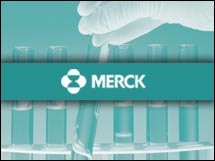Merck sets sights on new arthritis blockbusterDrug maker hopes new painkiller can replace the notorious Vioxx.NEW YORK (CNNMoney.com) -- Merck is experimenting with a new arthritis painkiller that could replace Vioxx, the former billion-dollar blockbuster that has proven to be a liability for the company. Merck (up $0.24 to $43.12, Charts), the No. 4 U.S. drugmaker, said that next week it plans to unveil the results of a study showing that the new drug, Arcoxia, is safer than Vioxx. Vioxx was taken off the market on Sept. 30, 2004 after a study showed increased risks of heart attacks and strokes.
Arcoxia is already available in 62 countries, with $192 million in the first nine months of the year in sales. Now Merck is applying for approval in the United States with data it says shows the the drug is an effective and safe once-daily treatment for osteoarthritis, the most common type of arthritis. Merck submitted the original drug application drug to the Food and Drug Administration in 2003, and the agency requested more data in October 2004, just weeks after Vioxx was pulled from the market. Merck's new study compares Arcoxia to a commonly-used painkiller called diclofenac, a member of the same drug class as naproxen and ibuprofen. Merck announced preliminary results of the study in August that showed Arcoxia to have the same cardiovascular safety as diclofenac, which is not known to increase the risk of heart attacks or strokes. "The relative risk between Arcoxia and diclofenac was the same," said Tracy Ogden, a Merck spokeswoman. Ogden said that the study is the largest arthritis drug study ever done, involving nearly 35,000 patients since 2002, and it is the first arthritis drug study that focuses on cardiovascular safety as its prime purpose. Merck will announce the results from the Arcoxia study on Monday in Chicago at the annual conference of the American Heart Association, and expects the FDA to complete its review in April, 2007. A slew other companies and biotechs will also be reporting results from drug trials at the conference, running from Nov. 12 to 15. The Arcoxia study is sure to draw attention because the drug is a Cox-2 inhibitor, the same drug class as Vioxx. Merck lost $2.5 billion in annual sales when Vioxx was pulled off the market. Since that time, more than 20,000 plaintiffs - former Vioxx patients and their family members - have sued Merck, blaming Vioxx for fatal and non-fatal heart attacks. Merck faces a double-edged sword with its Arcoxia study. The company must show that its experimental drug is much safer than Vioxx, but "any studies sponsored by Merck that showed dramatically different [safety] results than the other Cox-2s would be viewed skeptically," said Les Funtleyder, analyst for Miller Tabak. The other Cox-2 inhibitors Merck wasn't the only company to get stung risks associated with Cox-2 drugs. The Cox-2 inhibitor class also includes two Pfizer (down $0.13 to $25.71, Charts) drugs: Celebrex and Bextra. Pfizer took Bextra off the market at the request of the FDA in April 2005, losing $1.3 billion in annual sales. Celebrex has remained on the market, but with a much sterner "black box" label warning about the risks of heart attacks, strokes and gastrointestinal bleeding. Celebrex sales, which totaled $3.3 billion in 2004, are projected to be just $1 billion in 2006. Novartis (up $0.10 to $59.36, Charts), the Swiss drug giant, is also producing a Cox-2 inhibitor called Prexige, which won the approval of European regulators on Nov. 7. Novartis plans to file Prexige with the FDA in 2007. But on the day of its European approval, Gbola Amusa, analyst for Sanford C. Bernstein, said Prexige could have a hard time winning the hearts and minds of physicians because it's a member of the same drug class as Vioxx. Pfizer aiming for blockbuster combo Pfizer was planning to do a presentation at the Chicago conference on the late-stage study for its experimental Lipitor-torcetrapib combination. Few surprises were expected, because the company already unveiled preliminary results of this study on Oct. 31. For that reason, the AHA is not allowing Pfizer to present the data at the Chicago conference, claiming that the company broke its embargo, Pfizer said. Lipitor, which reduces LDL, or "bad" cholesterol, is already on the market as the world's top-selling drug, and Pfizer hopes the drug will break its own record this year with $13 billion in sales. Pfizer is working to combine Lipitor with the experimental drug torcetrapib, which increases HDL, or "good" cholesterol. If this combo is approved by the FDA, some analysts believe it could add billions of dollars in annual sales. Isis and others At the conference, Isis (up $0.19 to $10.38, Charts), a biotech, will announce data on its experimental drug Isis-301012, which would be added to cholesterol-cutting drugs like Lipitor and Merck's Zocor to further reduce harmful cholesterol like lipids and triglycerides. Isis chief executive Dr. Stan Cooke said his "phase 2" study for his experimental drug focuses on its ability to prevent the production of the protein present in harmful cholesterol by targeting RNA, the genetic process that creates it. Other companies are expected to release data at the AHA, including Takeda Pharmaceutical (Charts) with its diabetes drug Actos, Sanofi-Aventis (down $0.06 to $42.19, Charts) with its blood clot reduction drug Lovenox, and Alexion Pharmaceuticals (up $1.95 to $43.10, Charts) with its experimental heart disease treatment pexelizumab. Abbott nabs for cholesterol drug maker for $3.7 billion |
|

